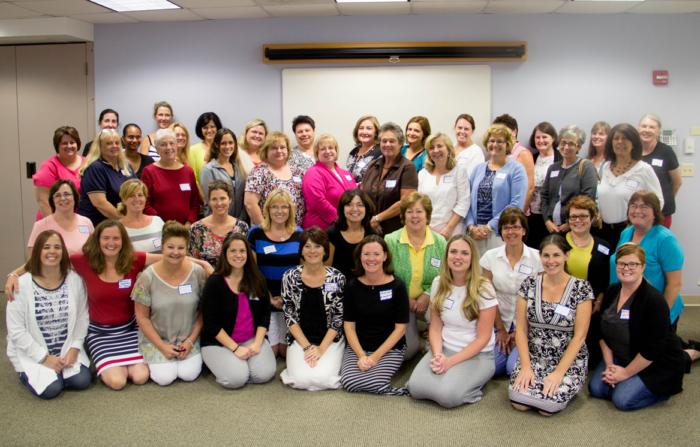Local
Training helps Catholic school nurses prepare for new year
By Christopher S. Pineo
Posted: 9/5/2014


Local Catholic school nurses take part in a day of training at the archdiocese's Pastoral Center Aug. 21. The program was developed jointly by the Catholic Schools Office and Northeastern University's School Health Institute. Pilot photo/Christopher S. Pineo
BRAINTREE -- Nurses duties generally pertain to student issues of health and wellbeing day-to-day, but sharing information can also play a key part in the role.
School nurses at a professional development program offered by the Catholic Schools Office and Northeastern University's School Health Institute at the Pastoral Center in Braintree, Aug. 21, had an opportunity to network, discuss and collaborate as presenters demonstrated resources available online to help do the job of keeping students healthy.
At the Health Initiative, a year-long opportunity for networking and educational opportunities for more than 100 school nurses who work at Catholic schools in the Archdiocese of Boston, presenters stressed the importance of communication for school nurses on the job.
"You might have a child with seizures, and there are things that you want the teacher to know," said Kathy Hassey, director of Northeastern University's School Health Institute (NEUSHI).
Hassey and her colleague Ann Farrell, who directs online programming for NEUSHI, led the first session, which the Catholic Schools Office and NEUSHI designed in collabration.
Presentations and talks at the event gave an overview of resources related to providing school health services and related office management.
Hassey and Farrell focused much of their presentation on resources available to nurses through the School Health Office's website at neushi.org.
The session also covered triaging -- assigning levels of urgency to dictate order of care in emergency situations -- working with students with chronic health issues, and adapting to school resources.
The Northeastern University website also provides information and support materials specific to situations nurses may encounter in the student population at their school. Subjects ranged from working with parents and teachers to recognizing signs that a student may be experiencing trauma in their home life. For example, Hassey said, school nurses participated in the gathering of information and creation of six program modules available online to help nurses recognize signs of human trafficking.
Catholic Schools Office operations associate Meghan Stellman introduced the online professional learning portal community.catholicschoolsboston.org, where school nurses can ask questions, network, and share best practices.
Stellman told The Pilot that the program would continue with two sessions scheduled after school hours as the academic year continues, and the final session at a day-long event in June 2015.
"The point is to help them network and also educate and create community," she said.
Nurses also heard from Laura Shapiro, an expert arranged by NEUSHI, on how students with ADHD can impact the role of school nurses.
CSO funded the program with a $10,000 grant from the Catholic Health Foundation of Greater Boston, a charitable endowment formed in 2013 using funds transferred from the charitable endowment for the former Caritas Christi Health System/Steward Health Care.
Terry Pedicini, school nurse at St. Mary School in Melrose said she found the talks and presentations interesting, but particularly considered the opportunity to interact with other school nurses a great benefit.
"In the past, we haven't been connected at all. It's great to see faces and meet some people that are peers," Pedicini said.